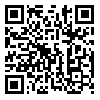BibTeX | RIS | EndNote | Medlars | ProCite | Reference Manager | RefWorks
Send citation to:
URL: http://journal.nkums.ac.ir/article-1-352-en.html
Abstract Background & Objectives: Recent studies have shown that the mother’s lifestyle has an important role in the methods used by mother to child feeding and child’s diet and BMI. This paper aimed to investigate the association between mother’s weight efficacy lifestyle with feeding practices and diet in 3- 6 years old children. Materials & Methods: A cross-sectional study of 165 parents with children aged 3-6 years was carried out in 30 primary schools of Rasht in 2012. Parents reported their own and their child’s demographics. Aspects of mother’s weight efficacy lifestyle and mother’s control practices were assessed using Weight Efficacy Lifestyle (WEL) questionnaire and Comprehensive Feeding Practices questionnaire (CFPQ) respectively. Height and weight of mothers participated in the study were measured. Child’s dietary intake was measured using Food Frequency Questionnaire (FFQ). Results: Results showed that mother’s weight efficacy was related to child feeding practices and child’s dietary intake. The mothers with similar weight efficacy lifestyle applied similar methods in child nutrition. Mothers with better weight efficacy used more encourage balance and variety, environmental control, child involvement and less emotion regulation using foods and their children eat fewer snacks. There was no significant relation between maternal self-efficacy and child BMI. Conclusion: The result of the study showed that maternal lifestyle was associated with feeding practices and child’s intake.
Received: 2015/03/16 | Accepted: 2015/03/16 | Published: 2015/03/16
| Rights and permissions | |
 |
This work is licensed under a Creative Commons Attribution-NonCommercial 4.0 International License. |





